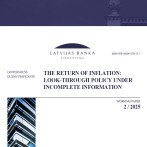October inflation data - the rising of prices risks are limited
Comparing the consumer prices of October and September, we see a small rise (0.4%), primarily attributed to the rise in the prices of processed foods, which in turn was accounted for by the rise in global food prices. The October price rise was by and large determined by the price dynamics of grain and milk products. The 12-month inflation reached 1.0%.
An important pressure of external factors on inflation has continued and is not likely to abate in the near future: the prices of both energy resources and food underwent global increases, making the imported raw materials more expensive, yet the weak domestic demand puts limits on any price rises. Albeit a gradual recovery is being observed in retail, demand is still low, which sets important limits on the possibilities of raising prices. This was evidenced also in the service price rate, which continued to drop in October when it was 3.2% lower year-on-year.
The prices of energy resources, which have been climbing in the last few months, will cause increases in fuel prices, but the amounts will be significantly pushed down by the drop in the value of the US dollar. Food prices, influenced by global prices, will also continue to rise for some time, yet the global food prices have begun stabilizing, which in turn is likely to reduce the pressure of food prices on inflation in Latvia as well. The 12-month inflation will be significantly affected also by the so-called base effect, which will be expressed as a higher 12-month inflation indicator at the end of the year but which in fact will reflect the rapid drop in prices observed at the end of last year.
As for the domestic factors affecting inflation: the fragile improvement in the labour market and predictions regarding the further development of the economy indicate that no rapid rise in domestic demand is expected which could exert an upward pressure on inflation as observed in the years of the overheating of the economy. The inflation risks will therefore be limited in the next few years and, even should prices rise slightly as a result of external factors, the rise in inflation will be moderate and short-lived. Against the background of the above processes, however, additional uncertainty would be caused by raising tax rates, which, combining with the rises in world energy resource and food prices would have a more substantial effect on inflation, causing the risk of growing inflation expectations. Thus we would simultaneously face economic stagnation and a faster rise in inflation.
The 12-month average inflation in October , the Maastricht criteria indicator was negative: deflation in the amount of 1.6% was observed. Core inflation, which does not include such variables as the prices of energy resources and unprocessed foods, also registered a price drop of 1.5% in October.
Textual error
«… …»






